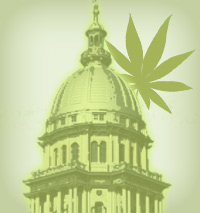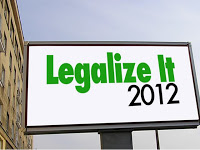 |
| NORML image |
The legalization and decriminalization of marijuana is an issue that has been making more and more appearances in legislative agendas throughout the America. What was once a taboo topic that kept supporters closeted with their opinions has made its way into open forums.
Lawmakers around the country are laying the groundwork to make way for legal weed states. The strict laws that today put many people into jail may soon be tossed aside in the same way as alcohol prohibition from the 1920s. The government saw back then that prohibition was a failed legislation and that there were benefits to be had by legalizing and regulating the sale of alcohol.
Many states are in the process of decriminalizing cannabis. This is not the same as legalization. With decriminalization, lawmakers are ending the arrest of individuals who are found in possession of small amounts of weed, typically an ounce or less. Instead of imprisonment and a criminal record, the person will be given a fine and the cannabis confiscated. It makes the enforcement of laws pertaining to marijuana a low priority for law enforcement.
Legalization would allow the sale and use of marijuana by adults under a regulated system in the same way that alcohol and tobacco are being controlled. By making it legal to grow, sell and use cannabis, the government will not only gain revenue but it will also reduce may costs that are associated with the arrest and incarceration of pot users. It is estimated that this could net the country an additional $20 billion annually.
To date, there are 15 states in America that have decriminalized weed. What was once a misdemeanor crime that entailed jail time and hundreds or thousands of dollars in fines is now considered a “non-arrestable civil offense” similar to getting a traffic ticket.
 |
| United States non-medical cannabis decriminalization laws.
State-level but not federal decriminalization of non-medical cannabis
No federal or state level decriminalization of non-medical cannabis
|
Alaska: Alaska voters have opted not to legalize weed in the state. In 2000 and 2004, voters rejected legislation that would remove the criminal and civil penalties for cannabis usage and possession. It would have also allowed the state to regulate the sale of weed in the same way as alcohol. However, there is no penalty for the private possession of less than 4 ounces of weed and no more than 25 plants being cultivated in your residence. This is to protect residents’ constitutional right to privacy. Alaska also has laws enacted for legal medical marijuana use.
California: Senate Bill 1449 was signed into law in 2010 to decriminalize the possession of up to one ounce of marijuana. This eliminates the need to appear in court, treating the offense as a minor infraction with a $100 fine. Proposition 19 was introduced and rejected in 2010, which would have made recreational use of marijuana legal. California was one of the first medical pot states, approving Proposition 215 back in 1996, known as the Compassionate Use Act.
Colorado: Possession of marijuana between 2 and 6 ounces for private use is considered a petty offense and has a maximum penalty of $100. Medical marijuana use is legal in this state.
Connecticut: In 2011, Connecticut passed SB 1014, legislation that decriminalized small, personal amounts of marijuana, up to one-half ounce. It is considered a non-criminal infraction with a maximum penalty of $150. This is another medical pot state as well.
Maine: Non-medical marijuana possession in small amounts up to 2.5 ounces is classified as civil, non-criminal offenses since 2009. Fines for possession are between $350 and $1,000. Medical use marijuana was approved in 1999.
Massachusetts: In 2009, the punishment for marijuana possession, up to one ounce, was reduced to a civil infraction with a fine of $100. Senate Bill 1801 and House Bill 2929 were drawn up in an attempt to legalize and tax the marijuana industry but did not pass into law. Legislation to legalize the medical use of weed is still pending.
Minnesota: Possessing less than 42.5 grams of pot is a misdemeanor that carries a fine up to $200 maximum. Medical usage of weed is not legalized in this state.
Mississippi: Possession of up to 30 grams of weed is a misdemeanor offense with a fine of up to $250. The use of medical marijuana has not been legalized.
Nebraska: Possessing one ounce or less of weed is considered a civil infraction with an imposed fine of $300. The state has now laws allowing the use of medical marijuana.
Nevada: Marijuana possession up to one ounce is considered a misdemeanor and offenders are subject to a fine up to $1,000 for first and second offenses. Legalization of medical marijuana was enacted in 2001.
New York: New York has decriminalized the possession of up to 25 grams of marijuana. The maximum penalty for the first offense is a $100 fine. For the second offense, $250. Medical marijuana use has still not been approved but legislation is pending.
North Carolina: Possessing up to one-half ounce of cannabis is a misdemeanor offense. At this time, there is no law allowing for medical use of weed.
Ohio: Possession of no more than 100 grams of weed is a misdemeanor offense with a fine up to $150. Legislation to legalize medical use of marijuana is still pending.
Oregon: Oregon was the first state to decriminalize marijuana back in 1973. Possession of up to one ounce of weed is a civil violation that carries a fine of up to $500-$1000 depending on county. Patients with a doctor’s prescription are allowed to cultivate, possess and use marijuana under Senate Bill 1085.
Rhode Island: The governor passed the legislation in June 2012 to reduce the penalty for marijuana possession to a civil infraction with a maximum fine of $150.
New Jersey may be the 16th state to decriminalize marijuana. The General Assembly approved the measure (AB 1465) that will reduce the penalty for possessing up to one-half ounce of weed from a $1,000 fine with up to six months in jail to a civil infraction with no criminal record and no jail time.
It is awaiting approval by the state Senate. However, the governor of New Jersey has already stated that he will veto the bill even if it passes. Yet, Gov. Chris Christie has openly stated the “war on drugs” is a complete failure.
Though only a fraction of the states have taken steps to “legalize” marijuana, there are still many states that refuse to lessen the punishment for such offenses. Some are even pushing to increase the punishment for anyone found in possession of marijuana.
Read other articles by Activist Post HERE
You can support this information by voting on Reddit HERE
linkwithin_text=’Related Articles:’
Leave a comment
You must be logged in to post a comment.



Be the first to comment on "Legal Weed: States Where Cannabis is Decriminalized"